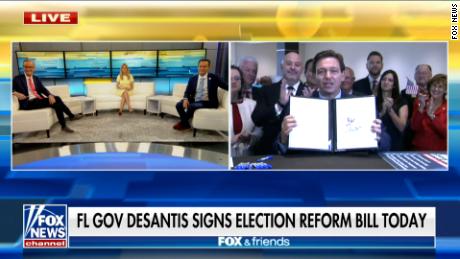Fact check: Here’s what Florida’s new elections law actually does
We can’t list every provision of a 48-page bill. But since elections laws tend to be the subject of furious political spin, here is a simple look at 10 of the law’s most significant provisions.
Limits on drop boxes
The law reduces the number of hours that ballot drop boxes can be made available to voters.
The law says that if “any” drop box is left accessible to voters in a manner that violates the new rules, the supervisor is subject to a civil penalty of up to $25,000.
Double the work required to apply for mail-in ballots
The law requires Florida voters to do extra labor to obtain mail-in ballots.
Now, a voter’s application gets them a mail-in ballot for a single election cycle. So an application filed in 2021 would obtain a 2022 ballot but not a 2024 ballot as well.
The new law does include a grandfather clause. Voters who filed applications before the 2020 election will still get mail-in ballots for the 2022 election as previously planned.
New voter ID requirements
A limit on ballot collection
The law makes it a first-degree misdemeanor to possess or deliver more than two mail-in ballots per election, other than a voter’s own ballot and the ballots of “immediate” family members. In other words, it is now a crime for someone in Florida to drop off the sealed ballots of, say, two elderly neighbors and a disabled cousin, or two nieces and a nephew who work long hours and don’t have cars. (There is an exception for ballots collected during supervised voting periods at nursing homes and assisted living facilities.)
A restriction on unsolicited mail-in ballots
A ban on donations to elections agencies
The bill prohibits agencies and elections officials from accepting a donation from an individual or non-governmental entity to fund election-related expenses, voter education, voter outreach or voter registration. (There is an exception for donations of space to be used as a voting site.)
Broadened restrictions on “solicitation”
The law broadens Florida’s restrictions on the “solicitation” of voters within 150 feet of voting locations.
The law adds drop boxes to the list of voting locations covered by the 150-foot no-solicitation zone. And the new law says illegal solicitation in the 150-foot zone includes not only seeking votes, seeking signatures and handing out leaflets but “engaging in any activity with the intent to influence or effect of influencing a voter.”
The new law does not explicitly ban people from giving out food and drink to voters within the 150-foot zone. But since even giving out a cup of water might well be perceived by some as an activity with the intent to influence a voter, the law could deter people from providing such refreshments within the zone. (The law says nonpartisan staff or volunteers working with local elections supervisors are permitted to hand items to voters.)
A mandatory warning about registration efforts
The law requires any third-party organization that conducts voter registration work to tell residents that the organization might not deliver their application on time for the next election, and to also explain to residents that they can submit a registration form on their own rather than relying on the group to send it in.
More rights for partisan observers
The law says that a candidate, party official, political committee official or a designate of these people has to be given “reasonable access,” if they request it, to “review or inspect ballot materials” — before votes are counted. The law says these ballot materials include “voter certificates on vote-by-mail envelopes, cure affidavits, corresponding comparison signatures, duplicate ballots, and corresponding originals.”
Hays, the Republican supervisor in Lake County, noted that a single ballot might include more than 15 different races. He said it doesn’t make sense to allow so many people into the room with elections staffers while they are doing critical high-intensity work.
“The worst possible time to have a conflict in an elections office is in the last three weeks of an election,” Hays said. He said he intends to define “reasonable access” as allowing the partisan observers to watch the proceedings from outside the room — through large interior windows and on a 55-inch television screen. “We have nothing to hide but we will not allow the administration of the election to be interrupted,” he said.
Increased vacancy-filling power for the governor
![]()




